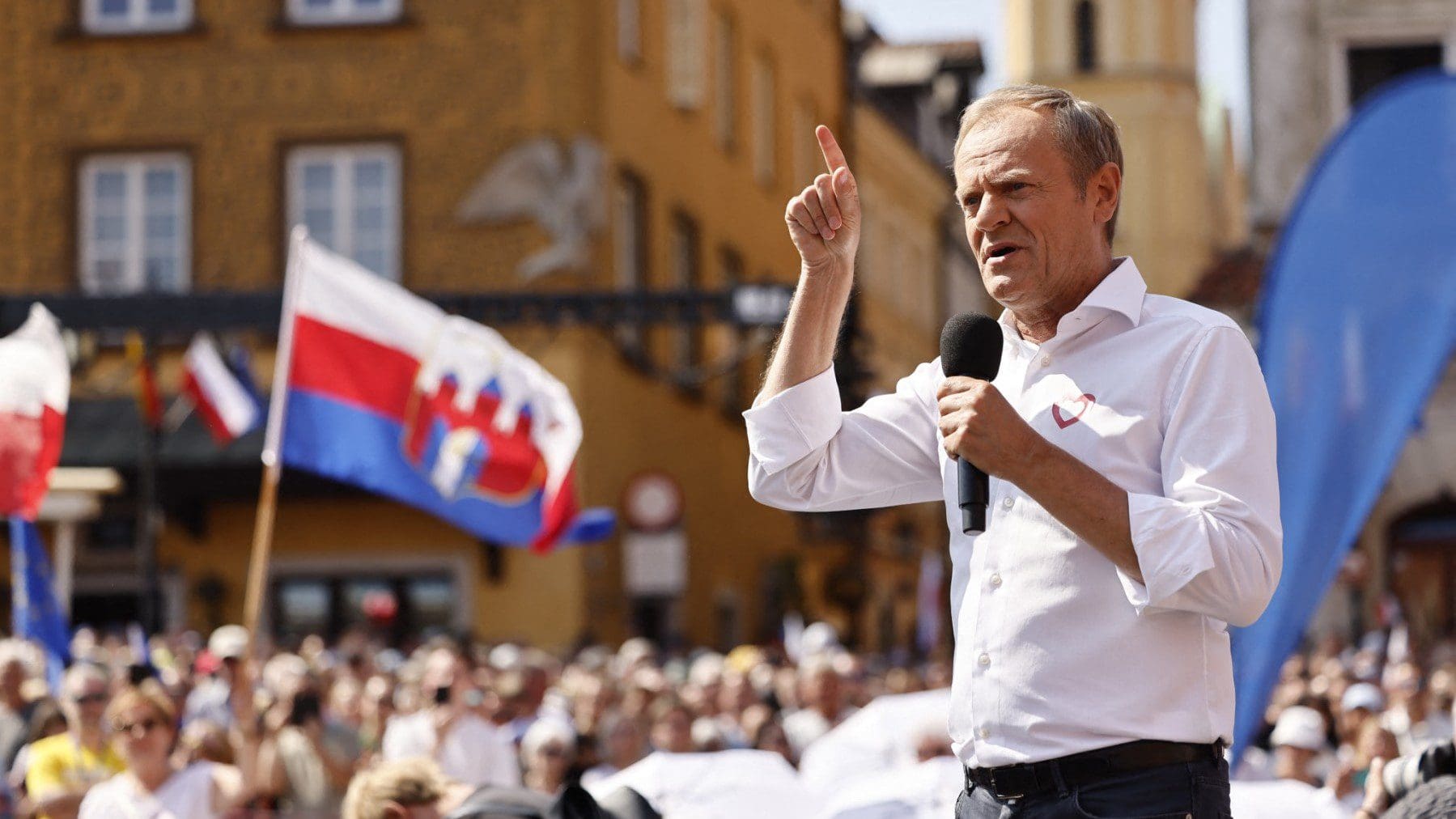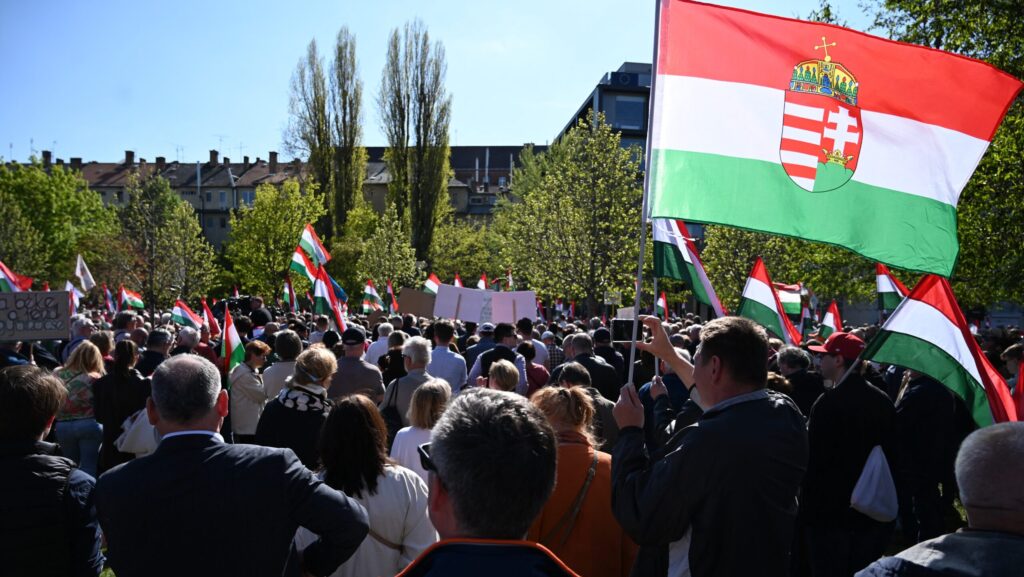The following is a translation of an article written by foreign affairs journalist Mátyás Kohán, originally published on Mandiner.hu.
Will the right-wing populist and national-conservative governing party of Poland, Law and Justice, remain in power after eight years of governing, or will its diverse opposition defeat it? The outcome of the Polish election is open in the final weeks of the campaign.
The confetti cannon has been fired and the Polish campaign is officially underway: at the beginning of August, President Andrzej Duda set 15 October as the date for the parliamentary elections, an event that is making not only the Poles but also Hungarians hold their breath.
Coalition Versus Coalition
The governing Law and Justice (PiS) has improved its position somewhat in recent months, with its support rising from 35 to 39 per cent since July, according to the POLITICO’s Poll of Polls average, and its rise is still unbroken. The most promising opposition grouping, the Civic Coalition (KO), made up of the Civic Platform (PO) and several smaller parties, is stagnating at 30 per cent. However, the other two right-wing opposition forces are in trouble: the mildly anti-Ukrainian, economic liberal position of the Liberty and Independence Confederation is now supported by only 11 per cent of Poles, down from 14 per cent now that inflation has decreased, while the Third Way (TD) alliance, which used to be neck and neck with the KO, has been shrinking since its formation in April and now stands at only 8 per cent, the same as the Left, which brings together all the red parties in Polish society which is not exactly keen on leftism as such.
The opposition can also blame itself for the rise of the governing party. Ex-Prime Minister Donald Tusk, former President of the European Council and of the European People’s Party, and KO’s prime ministerial candidate—who, not independently of his own career decisions, has acquired the disgraceful public image in Poland of ‘Germany’s favourite Pole’—recently made an unfortunate statement about EU funds. Similarly to our country, Poland has not received a cent of the EU funds, despite being perfectly aligned with the EU mainstream regarding the war. ‘I make the solemn promise that the day after the election, after the victory, I will go and unblock this money,’ Tusk said. ‘A little good will, competence, is sufficient for that money to once again start to benefit each and every one of us,’ he added. However, rather than boosting KO’s popularity, the hope of an EU cash windfall has reinforced the ruling party narrative that the European Commission is withholding money from Poland only to break its economic growth and catapult its staunch ally Tusk into the Ujazdów Avenue Chancellery.
‘Tusk has acquired the disgraceful public image in Poland of “Germany’s favourite Pole”’
In addition, the Civic Coalition’s popularity surge in the spring and early summer proved to be a mere illusion, as Tusk and his party only managed to attract voters from the other big centre-right bloc, the Third Way, which is made up of TV presenter Szymon Hołownia’s Poland 2050 Party (PL2050) and the Polish Coalition (KP), a smallholders-centre-right mini-coalition. The largest member of the Polish Coalition, the Polish People’s Party (PSL), used be part of the Tusk government, and voters gradually realized that the Third Way was not really a third way, as it could only become a governing force as a partner of the Civic Coalition, helping Tusk back to power. So, in a flash, all those who would not want to see the former prime minister at the helm of a government deserted it, and those who accept Tusk, switched sides and joined the camp of the original Tusk. The remaining voters are presumably voting for the Third Way on the basis of the party’s programme. The party, by the way, is making Péter Márki-Zay’s nicest dreams come true: in the name of stopping election overspending, they have not voted for the increase in family allowances this year, would pay for private health care at the expense of the social security system, oppose gay marriage, and would hold a referendum to resolve the abortion debate that heated up in 2020.
The Confederation is a more credible representation of third-partyism. Its leader, Sławomir Mentzen, is campaigning for the retirement of Jarosław Kaczyński and Donald Tusk and is also being harsh on the coalition issue: he is willing to govern with either of the two big blocs, but only if they implement his economic programme. This would be easier for the more economically liberal KO than the more paternalistic governing party, but on EU and culture war issues, the KO and Confederation positions are irreconcilable. At least on the face of it.
Tusk and Kaczyński
The government is concentrating its campaign on Donald Tusk, and the portrayal of the former PM as a sovereignty-killing eurocrat in German pay seems to resonate well with Poles. The de facto leader of PiS, Deputy Prime Minister Jarosław Kaczyński, described Tusk at a campaign event as ‘the personification of pure evil’ who would ‘implement a plan that is not Polish, but [a plan] of the Brussels bureaucracy’. This image is also played on by other key figures in the governing party campaign, such as Prime Minister Mateusz Morawiecki, who at another event said ‘let’s send Tusk back where he came from’—that is, to Brussels.
The kind of highly emotional dogfight, full of ad hominem attacks that characterizes the Kaczyński–Tusk opposition is in fact a decades-long tradition in Polish politics. In 2021, when there was no war yet and the Polish government could not pose as Vladimir Putin’s greatest enemy, upon his return to domestic politics, Tusk said that the evil PiS ‘is implementing Putin’s agenda’. An exciting communication strategy in hindsight…
A Referendum Modelled on the Hungarian Example
The main campaign tool of the governing party is a four-question referendum, which—presumably as a copycat of the concoction of the political laboratory of the Hungarian right—will be held at the same time as the election. The referendum was initially only supposed to be about the EU migration pact that would bring the Polish–Hungarian tandem back together, but it has since been expanded to include three other important questions in which the government is trying to push the opposition into uncomfortable positions.
‘The opposition can also blame itself for the rise of the governing party’
The first question asks whether voters support the sale of state-owned companies to foreign enterprises. This question fits into the narrative of Kaczyński, who said that ‘the Germans want to install Tusk in Poland, to sell off all public assets’. The opposition retorted by pointing out that the government sold a minority stake in the PKN Orlen oil company to Saudi Aramco and Mol last year—though it did not add that it happened in compliance with EU competition rules.
The second question is about raising the retirement age—on economic and social policy issues, PiS defeated Tusk by overtaking him from the left in the 2015 election, lowering the retirement age to 60 for women and 65 for men. This is what the second question would refresh voters’ memories about.
The third question deals with the migration pact. Here the opposition argues that, firstly, it is already a done deal, so it is pointless to vote on it; secondly, Poland could even benefit from the pact because of the large number of Ukrainian refugees it is taking in; and thirdly, the guest worker card, which is also known in Hungary, has been brought up as well. This was so successful that the government immediately backed down from its plan to introduce visa facilitation for nationals of several Asian countries to ease labour shortages in Poland. However, the opposition does not deny that it supports the pact, which seems to be having an effect on public opinion—which is why Morawiecki called Tusk ‘the greatest threat to Poland’s security’.
With the fourth question, regarding the fence on the Belarusian border, the government intends to play the Russian card. Poland started building a fence on its border with Belarus last year to counter the migration crisis organised by Minsk. Many in the opposition opposed the fence and advocated for its demolition—so Defence Minister Mariusz Błaszczak is now bashing Tusk and his team for exposing Poland to potential Russian aggression if the fence was dismantled.
‘The referendum is a masterful way of playing to voters’ sensibilities’
The referendum is a masterful way of playing to voters’ sensibilities, so it is no wonder that Tusk is calling on his voters to boycott it. That did not work at all in Hungary for the child protection referendum, and it is questionable whether there is room for a similar boycott policy in Poland. Tusk will soon find that out for himself, as the opposition boycott has led to the creation of a committee to investigate Russian influence, which the opposition has labelled as a political weapon invented specifically against Tusk, and all nine members of which are from the ruling party, rather than five from the ruling party and four from the opposition. It will be clear before the election whether it was a good decision on the part of the opposition to let the governing parties have the committee to themselves.
The government, by the way, has received help from an unexpected place: the longest serving US Congressman, Republican Chris Smith, has publicly supported the €1,300 billion Polish claim for compensation that PiS regularly submits to Germany, almost as a ritual. But will the American tailwind be enough to break the deadlock in which, polls suggest, neither the ruling party nor the left could form a government without the Confederation, a nuisance to both?
***
Roman Giertych, or ‘the Slaughter of the Sacred Cows’
The ‘sacred cows’ of Polish politics are being slaughtered in Kielce these days. The story began when Jarosław Kaczyński announced—not unrelatedly to the spectacular opposition turnaround in the capital—that he would not stand in his Warsaw constituency for the first time in 32 years: rumour has it he made that decision because he did not want to get fewer votes than Tusk. It is an open secret that he will run instead in Kielce in central Poland, a safe PiS constituency. However, to make sure Kaczyński is not alone, Tusk and his team, in a sly move, are fielding their own former deputy prime minister, Roman Giertych, who joined the opposition coalition this year, in the same electoral district. Giertych has always been to the right of PiS, so he may even a chance in the traditionally deep-conservative constituency. But there is a snag: in order to appeal to pro-abortion voters, Tusk has previously promised that only pro-abortion candidates would be allowed to stand on his list, and Giertych, being a hard-core conservative, is anti-abortion. His candidacy is therefore openly opposed by KO MPs, too.
Related articles:
Click here to read the original article.








